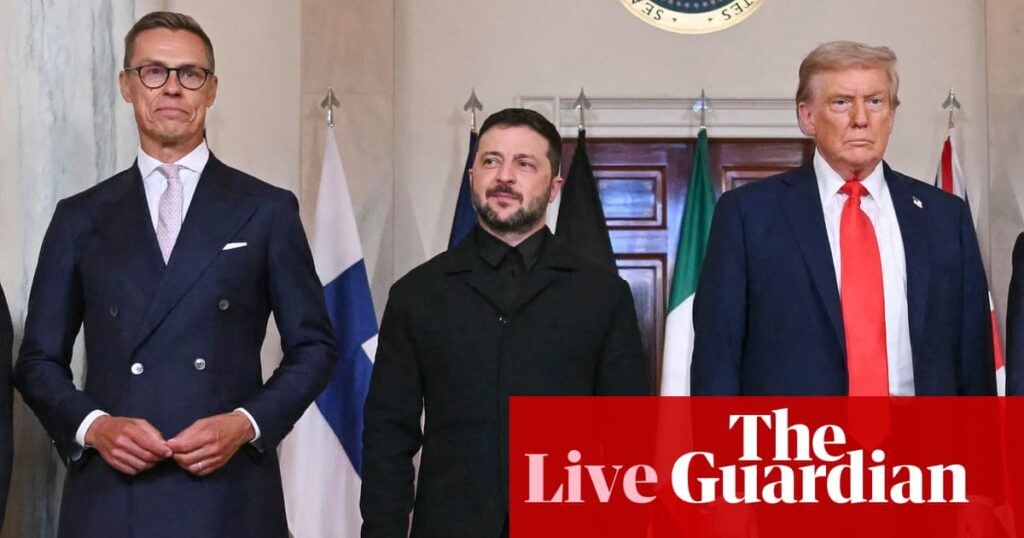Work with partners on security guarantees ‘must be accelerated,’ Zelenskyy says
Ukraine’s president Volodymyr Zelenskyy has just posted a brief update from his meeting with the military, after receiving an update on the situation on the frontline.
He stressed the work being done on the Donetsk and Zaporizhia regions, and the need for “additional supplies for these areas”.
But crucially, he also said there was a report on the work with the Coalition of the Willing, Europe, and the US.
“There will be more relevant meetings and working contacts during the week. It was noted that the dynamics of work must be accelerated,” he said.
The defence component of security guarantees should be detailed in the near future.
Key events
Closing summary
Jakub Krupa
… and on that note, it’s a wrap!
-
Ukrainian president Volodymyr Zelenskyy has said that the work on drafting security guarantees for Ukraine with allies “must be accelerated,” as he reported back after a meeting with the country’s military (13:06).
-
Finnish president Alexander Stubb earlier said he hoped Trump’s patience with Putin would run out soon, as he discussed his recent phone call with US president Donald Trump, warning him of Putin’s delaying tactics (10:06).
-
Belgian prime minister Bart De Wever said it would be best to leave frozen Russian funds at Belgium-based Euroclear until any peace talks between Russia and Ukraine are concluded (14:41).
-
A combat drone, presumed to be Ukrainian, went off course and exploded over Estonia without causing any casualties, the Baltic state and close Ukraine ally said (14:12).
In other news,
-
A public letter signed by 209 former EU ambassadors, senior diplomatic staff and ambassadors from EU nation states has been published today, calling for urgent action over Israel’s war in Gaza and unlawful actions in the West Bank (16:08).
-
The European Commission has rejected any suggestion it could bow to pressure from US president Donald Trump on digital regulation, saying it was its “sovereign right” to decide these rules (12:35).
-
Lithuania’s parliament on Tuesday voted in favour of letting social affairs minister Inga Ruginienė seek to form a new cabinet (11:03).
And that’s all from me, Jakub Krupa, for today.
If you have any tips, comments or suggestions, email me at jakub.krupa@theguardian.com.
I am also on Bluesky at @jakubkrupa.bsky.social and on X at @jakubkrupa.
Hundreds of senior diplomats call for EU to take urgent action over Gaza crisis

Emma Graham-Harrison
A public letter signed by 209 former EU ambassadors, senior diplomatic staff and ambassadors from EU nation states has been published today, calling for urgent action over Israel’s war in Gaza and unlawful actions in the West Bank.
If the EU will not act collectively, member states must take steps individually or in smaller groups to support human rights and uphold international law, the letter says, laying out nine possible approaches.
They include suspending arms export licenses, barring trade in goods and services with illegal settlements and barring European datacentres from receiving, storing or processing data from Israeli government or commercial sources if it relates to Israel’s “presence and activities in Gaza and elsewhere in the occupied territories”.
Signatories include 110 former ambassadors, 25 former director general and two of the most senior diplomats in the EU – Alain Le Roy, former secretary general of the European External Affairs service and Carlo Trojan, former secretary general of the European Commission.
More over on our Middle East blog:
Ukrainian senior officials in Qatar for talks on defence
Ukraine’s senior officials, including top presidential aide and national security council chief, were in Doha on Tuesday for talks on defence with a Qatari defence minister, it emerged.
Andriy Yermak, top aide to Ukraine’s president Volodymyr Zelenskyy, said in a post on Telegram that he and former defence minister and current national security council chief Rustem Umerov met with Qatari’s sheikh Saud bin Abdulrahman bin Hassan Al-Thani.
“We discussed common interests in the field of security and defence, as well as ways to further develop the partnership between Ukraine and Qatar,” he said.
Poland’s president vetoes legislation to prolong benefits for Ukrainian refugees
Yesterday, Poland’s new president has vetoed legislation to prolong benefits received by Ukrainian refugees in Poland, following up on a campaign promise to tighten welfare payments amid a steady growth in anti-Ukrainian sentiment among Poles.
Karol Nawrocki, who took office earlier this month after winning an election in June, said only Ukrainians in work should receive child benefit payments.
“We remain open to providing assistance to Ukrainian citizens – that hasn’t changed,” said Nawrocki in a statement. “But after three and a half years, our law should be amended.”
Nawrocki vetoed a bill that would have extended the current system of payments, due to expire in September, until March 2026. About 1 million refugees are believed to have settled in Poland since 2022, many of them women and children.
The country’s prime minister, Donald Tusk, criticised the veto, as did others in his government.
President Nawrocki has proposed his own draft legislation on Monday, which allies say should be fast-tracked and passed before October, to amend the most important parts of the current system, while addressing the perceived unfairness over how the funds are spent.
The presidential bill’s adoption would also prevent some technical issues that could be triggered by the veto, if no alternative legislation gets passed before the deadline, amid some question marks over the future Poland’s financing of Starlink satellite internet access for Ukraine.
Belgian prime minister warns against seizing Russian funds in Euroclear
Belgian prime minister Bart De Wever said it would be best to leave frozen Russian funds at Belgium-based Euroclear until any peace talks between Russia and Ukraine are concluded.
“A whole lot of these funds are immobilized in Brussels at Euroclear. I know that there are governments that are trying to seize the money. But I would like to warn that this is not so easy legally,” De Wever told reporters during a joint news conference with German chancellor Friedrich Merz in Berlin, Reuters reported.
Estonia reports crash involving ‘diverted Ukrainian drone’
A combat drone, presumed to be Ukrainian, went off course and exploded over Estonia without causing any casualties, the Baltic state and close Ukraine ally said on Tuesday, AFP reported.
Pieces of the drone, which left a crater on crashing, were discovered by an agricultural worker near the south-eastern town of Tartu, 75 kilometres (45 miles) from the border with Russia.
“Based on preliminary data we have reasons to believe it was a Ukrainian drone targeting objectives on Russian territory,” said Margo Palloson, director general of Estonia’s Internal Security Service (ISS).
Palloson told reporters the device was able to be “diverted from its trajectory by Russian GPS jamming and other electronic warfare means, causing it to enter Estonian airspace.”
Last week, the Polish defence minister denounced Russian “provocation” towards Poland and Nato after a Russian drone fell and exploded in a field in eastern Poland, again causing no casualties.
Similar incidents were previously reported in Romania, Lithuania and Latvia.
We need to put pressure on Russia, EU says, with hopes to get progress update on guarantees for Ukraine ‘soon’
Meanwhile in Brussels, EU foreign affairs spokesperson Anitta Hipper just said that it is “very clear” for the EU that “we need to put pressure on Russia to make sure they are willing to compromise” and to get strong security guarantees for Ukraine.
EU’s foreign policy chief Kaja Kallas took part in a call with Rubio and several European foreign ministers last night (9:51), she said.
Chief commission spokesperson Paula Pinho also added that there should soon be a report from the national security advisers tasked with looking into potential security guarantees for Ukraine in the aftermath of last week’s Washington summit on Ukraine.
“We should soon be hearing from that group, from the national security advisers, on what has been discussed, what has been identified and what will be put forward,” she said.
Work with partners on security guarantees ‘must be accelerated,’ Zelenskyy says
Ukraine’s president Volodymyr Zelenskyy has just posted a brief update from his meeting with the military, after receiving an update on the situation on the frontline.
He stressed the work being done on the Donetsk and Zaporizhia regions, and the need for “additional supplies for these areas”.
But crucially, he also said there was a report on the work with the Coalition of the Willing, Europe, and the US.
“There will be more relevant meetings and working contacts during the week. It was noted that the dynamics of work must be accelerated,” he said.
The defence component of security guarantees should be detailed in the near future.
EU dismisses concerns about Trump’s digital regulation comments overnight
The European Commission has rejected any suggestion it could bow to pressure from US president Donald Trump on digital regulation after his overnight expression of frustration with “digital taxes” and “digital services legislation and digital markets regulation” in other countries.
The linguistic similarity with the two flagship EU rulebooks – the Digital Services Act and the Digital Markets Act – was probably not accidential there.
Trump said he would “stand up to Countries that attack our incredible American Tech Companies,” adding:
“This must end, and end NOW! With this TRUTH, I put all Countries with Digital Taxes, Legislation, Rules, or Regulations, on notice that unless these discriminatory actions are removed, I, as President of the United States, will impose substantial additional Tariffs on that Country’s Exports to the U.S.A., and institute Export restrictions on our Highly Protected Technology and Chips.”
The commission chief spokesperson Paula Pinho said:
“I think it’s useful to recall what we’ve been saying a number of times, that it is the sovereign right of the EU and its member states to regulate economic activities on our territory which are consistent with our democratic values.”
She added digital regulation “was not part of our recent agreement with US.”
EU’s tech spokesperson Thomas Regnier also sought to dismiss Trump’s concerns that the EU’s rules in any way seek to target US companies or “give a complete pass to China’s largest tech companies.”
He said:
“On the fact that we’re targeting US companies, this is something that we can firmly rebut, however. The DSA does not look at the color of a company, at the jurisdiction of a company, nor at the owner of a company.”
He also added that the last three EU enforcement decisions were against Chinese or Chinese-linked services, Aliexpress, Temu, and TikTok.
How Ukraine became one of the most heavily mined countries in the world?
In north-east Ukraine, less than 50km from the Russian border, lies the city of Shostka.
In the first months of the full-scale invasion it was blockaded, and ever since has faced constant shelling and drone strikes from the Russian army.
But if and when the attacks stop, there will be an invisible danger that will linger for much longer: unexploded devices.
Ukraine is now one of the most heavily mined countries in the world, with about a quarter of its territory – an area larger than England – contaminated with explosives.
Since the start of the full-scale invasion, just under 1,000 people have been injured and 359 killed by mines and explosive remnants of war, including at least 18 children, according to data shared by the state emergency service of Ukraine.
UN mining expert Paul Heslop says there are already more than 1m mines scattered across Ukraine, and that Russian forces “widely booby trapped” parts of the country as they retreated. This includes bigger pressure-plate landmines (often called anti-tank or anti-vehicle mines) that contain a lot more explosive (5-10kg) and are triggered by heavier vehicles such as cars, tanks or military trucks.
Woody Allen rebuts Ukrainian condemnation over Moscow film festival appearance

Andrew Pulver
Woody Allen faced criticism after he had appeared on Sunday at Moscow international film week, via a remote link for a session hosted by film-maker Fyodor Bondarchuk, a long-term political ally of Putin and director of patriotic epics such as Stalingrad (2013) and the sci-fi film Attraction.
But Allen has denied claims that his participation in a Moscow film festival was “whitewashing” Russian atrocities, after condemnation of his appearance by Ukraine’s ministry of foreign affairs.
In a statement posted on social media, the ministry said: “Woody Allen’s participation in the Moscow international film week is a disgrace and an insult to the sacrifice of Ukrainian actors and film-makers who have been killed or injured by Russian war criminals in their ongoing war against Ukraine.”
It added: “By taking part in a festival that brings together Putin’s supporters and voices, Allen chooses to turn a blind eye to the atrocities Russia commits in Ukraine every single day for 11 years now. Culture must never be used to whitewash crimes or serve as a propaganda tool. We strongly condemn Woody Allen’s decision to bless Moscow’s bloody festival with his address.”
Allen said in a statement to the Guardian:
“When it comes to the conflict in Ukraine, I believe strongly that Vladimir Putin is totally in the wrong. The war he has caused is appalling.
But, whatever politicians have done, I don’t feel cutting off artistic conversations is ever a good way to help.”
Ruginienė step closer to becoming Lithuania’s next prime minister
Meanwhile over in Vilnius, Lithuania’s parliament on Tuesday voted in favour of letting social affairs minister Inga Ruginienė seek to form a new cabinet, bringing her a step closer to leading the government, Reuters reported.
She is on course to replace Rimantas Šadžius, who is holding the fort after Gintautas Paluckas’s resignation last month.
Ruginiene of the ruling Social Democrats party must still get the president to approve her cabinet, and will face a second vote by parliament in September to confirm its manifesto.

Warren Murray
Residents queueing up with bottles at tanker trucks petition Putin for help; Polish president vetoes support for Ukrainian children. What we know on day 1,280 of the war.
You can read our daily briefing here:
Finland’s Stubb says he hopes Trump’s patience with Putin will run out soon — Finnish media
Finnish president Alexander Stubb has been speaking at a press conference before the country’s ambassadors’ conference in Helsinki.
In comments reported by the Finnish public broadcaster, Yle, he said that he hoped Trump’s patience with Putin would run out soon.
He insisted that Finland and other European countries “will do everything we can do achieve lasting peace.”
He also hinted that the only way to force Putin to end the invasion of Ukraine would be by hitting his allies, qupping “the only ones who can persuade Putin to make peace are more in the east than in the west.”
In further comments reported by Ilta-Sanomat, he added that the current discussions were focusing on the extent of security guarantees that would be offered to Ukraine.
Stubb also said he warned Trump that Putin was deploying a “typical” Russian delaying tactic to avoid meeting Zelenskyy.
Morning opening: Is this meeting on?

Jakub Krupa
US president Donald Trump warned last night that there could be “consequences” if Russian president Vladimir Putin and Ukrainian president Volodymyr Zelenskyy do not meet. Who would face these consequences and what they could possibly entail is not exactly clear.
Despite much speculation about the timing and the potential location for the Putin-Zelenskyy meeting, we do not appear to be any closer to it actually happening as Russian attacks on Ukraine continue.
Asked why Putin didn’t want to meet with Zelenskyy, he offered this explanation: “Because he doesn’t like him.”
Trump revealed that he had talked to Putin since his last week’s meeting with European leaders again.
Asked how the conversation talks went, Trump said:
“Every conversation I have with him is a good conversation. And then, unfortunately, a bomb is loaded up into Kyiv or someplace, and I get very angry about it.”
On a more technical level, US state secretary Marco Rubio spoke with his European counterparts last night, discussing potential security guarantees for the wartorn country should the meeting go ahead and the two leaders somehow managed to find a way to agree a peace deal. Once again, we are yet to see what emerges from these talks.
Ukraine’s foreign minister Andrii Sybiha praised the US leadership on this issue, but “reiterated … that security guarantees must be concrete, legally binding, and effective.”
But Poland’s foreign minister Radosław Sikorski warned the leaders that “the Kremlin has not abandoned its maximalist aims from the beginning of the war,” and insisted that the only way to get Moscow round to the negotiating table is through further political, economic and military pressure on its interests.
Let’s see what today brings us on these two issues.
Separately, I will also keep an eye on the latest in France as the country’s embattled prime minister looks likely to be ousted and his government toppled next month in a high-stakes confidence vote that could plunge the EU’s second-biggest economy into even deeper political crisis.
We should also get some new language on the EU-US trade arrangements, with Trump threatening overnight to impose tariffs and exports bans on countries with taxes and laws deemed to be discriminating against US tech companies. His longstanding criticism of the EU’s rulebook is well known, so this latest warning will probably draw another deep sigh from EU officials.
I will bring you all the key updates here.
It’s Tuesday, 26 August 2025, it’s Jakub Krupa here, and this is Europe Live.
Good morning.

